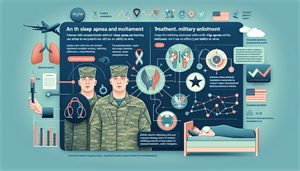
Can You Join the Military with Sleep Apnea?
Sleep apnea, a condition that disrupts normal sleep patterns, carries significant implications for military personnel. But can it affect military enlistment? Can you join the military with sleep apnea? Can it be managed within the military? And what about its impact on military readiness? These are questions we’ll unravel in this comprehensive exploration of sleep apnea in a military context.
Key Takeaways
-
The prevalence of sleep apnea has significantly increased among military personnel between 2005 and 2019, with deployments and disrupted sleep patterns contributing to this rise, and untreated OSA can lead to serious health complications.
-
The military has stringent medical fitness standards, often considering sleep apnea as disqualifying; however, waivers and exceptions exist if the condition is well-managed and does not impair duties.
-
Sleep apnea has considerable implications on military readiness, affecting physical performance, mental health, and injury prevention, with continuous positive airway pressure therapy being a central treatment modality.
Sleep Apnea and Military Enlistment
A silent but pervasive issue, sleep apnea has seen a 30-fold increase in prevalence among military personnel from 2005 to 2019, indicating a growing concern within the military community.
The rise in sleep disorders, including sleep apnea, among military personnel is attributed to extended and more frequent deployments, especially to combat zones such as Iraq and Afghanistan. These deployments can disrupt sleep patterns, contributing to the development of sleep disorders. Sleep apnea, particularly
Obstructive Sleep Apnea (OSA), military medical standards, and potential waivers and exceptions for enlistment are some of the key areas that need to be addressed when discussing sleep apnea in the military context. We will further explore these key areas.
Obstructive Sleep Apnea (OSA)
Obstructive sleep apnea (OSA) is the most prevalent form of sleep apnea, characterized by:
- Recurrent occurrences of partial or total obstruction of the upper airway during sleep
- Sleep apnea disrupts normal sleep patterns, leading to excessive daytime sleepiness and loud snoring
- Other indicators may include waking up with a dry mouth or sore throat, morning headaches, and difficulty breathing during sleep.
Neglecting to treat OSA, a common sleep disorder, could lead to severe health consequences, such as:
- High blood pressure
- Heart problems
- Type 2 diabetes
- Cognitive impairment
- Reduced reaction time
- Impaired decision-making abilities
Continuous Positive Airway Pressure (CPAP) therapy is the gold standard treatment for managing OSA symptoms, shown to lower blood pressure, reduce sleepiness, and improve overall adherence in adults with OSA.
Military Medical Standards
The Standards of Medical Fitness require individuals entering military service to adhere to specific health criteria, which apply to all branches of the military. These standards aim to ensure the absence of conditions that could disrupt military duties, including sleep apnea.
While individuals with sleep apnea may require a waiver for deployment, sleep apnea is usually deemed a disqualifying, non-waiverable medical condition for military enlistment. However, exceptions do exist, as we will explore next.
Waivers and Exceptions
In certain cases, waivers and exceptions may be granted for individuals with sleep apnea, provided the condition is well-managed and does not interfere with military duties. For instance, individuals using a CPAP device must submit a 30/60/90 day sleep analysis report as part of their medical records.
The potential impact of sleep apnea on performance is assessed through clinical evaluation, polysomnogram, and evaluation of compliance with treatment devices such as CPAP. Thus, while sleep apnea can be a barrier to military enlistment, it’s not an absolute disqualifier.


